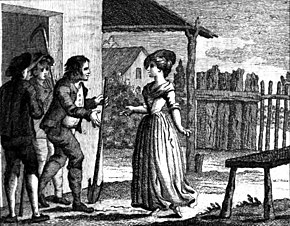Il filosofo di campagna (The Country Philosopher) is a dramma giocoso per musica in 3 acts by composer Baldassare Galuppi. The opera uses an Italian language libretto by Carlo Goldoni. The work premiered at the Teatro San Samuele in Venice on 26 October 1754.[1]
| Il filosofo di campagna | |
|---|---|
| Opera by Baldassare Galuppi | |
 Illustration from the 1795 publication of Goldoni's libretto | |
| Librettist | Carlo Goldoni |
| Language | Italian |
| Premiere | 26 October 1754 Teatro San Samuele, Venice |
Il filosofo di campagna, which has been defined a "masterly opera",[2] obtained a great success, with many performances throughout Europe.[2][3]
Roles edit
| Roles | Voice type | Premiere cast,[1] 26 October 1754 |
|---|---|---|
| Eugenia, daughter of Don Tritemio, unmarried | soprano | Giovannina Baglioni |
| Rinaldo, nobleman, in love with Eugenia | soprano | Angela Conti-Leonardi |
| Nardo, rich farmer, known as "the Philosopher" | bass | Francesco Baglioni |
| Lesbina, housemaid of Don Tritemio | soprano | Clementina Baglioni |
| Don Tritemio, coming from the city and lodging in the village | bass | Francesco Carattoli |
| Lena, niece of Nardo | soprano | Anna Zanini |
| Capocchio, notary of the village | tenor | Giacomo Caldinelli |
Synopsis edit
Tritemio wants his daughter Eugenia to marry Nardo, a rich farmer, known as "the Philosopher", but Eugenia is in love with the nobleman Rinaldo. Lesbina, housemaid of Tritemio, in order to avoid that Nardo meets Eugenia, takes the place of the girl. Nardo, who has never seen Eugenia before, ends up falling in love with Lesbina, convinced that she is the true daughter of Tritemio.
After a series of misunderstandings, Nardo learns of the true identity of Lesbina, but he accepts the housemaid all the same and remains in love with her.
Lesbina persuades Tritemio that she wants to marry him and a notary is called. When the notary arrives, without Tritemio knowing it, a double wedding is celebrated, between Nardo and Lesbina and between Rinaldo and Eugenia. Tritemio has to resign himself to the situation, but he finds his consolation marrying Lena, a niece of Nardo.
Recordings edit
| Year | Cast: Eugenia, Rinaldo, Nardo, Lesbina, Don Tritemio |
Conductor, opera house and orchestra |
Label |
|---|---|---|---|
| 1956 | Anna Moffo, Florindo Andreolli, Rolando Panerai, Elena Rizzieri, Mario Petri |
Renato Fasano, I Virtuosi di Roma |
Audio CD: Testament, Cat: TES 1195[4] |
| 2001 | Paola Antonucci, Patrizio Saudelli, Alessandro Calamai, Patrizia Cigna, Giorgio Gatti |
Francesco Piva, Intermusicale Ensemble |
Audio CD: Bongiovanni, Cat: GB 2256/8-2[5] |
References edit
Notes
- ^ a b Casaglia, Gherardo (2005). "Il filosofo di campagna". L'Almanacco di Gherardo Casaglia (in Italian).
- ^ a b Monson 1992
- ^ Mellace 1996.
- ^ "Baldassare Galuppi – Il Filosofo di Campagna – Renato Fasano (1956)". operaclass. Retrieved 18 January 2015.
- ^ "Baldassare Galuppi – Il Filosofo di Campagna – Francesco Piva (2001)". operaclass.com. Retrieved 18 January 2015.
Sources
- Monson, Dale E. (1992). "Il filosofo di campagna". In Sadie, Stanley (ed.). The New Grove Dictionary of Opera. Vol. 2. Oxford University Press. ISBN 978-0-19-522186-2.
- Mellace, Raffaele (1996). "Il filosofo di campagna". In Gelli, Piero (ed.). Dizionario dell'opera (in Italian). Milan: Baldini & Castoldi. ISBN 88-8089-177-4.
Further reading edit
- Piero Paci, "Note sul ritrovamento di una edizione sconosciuta de il Filosofo di campagna di Goldoni (Genova, Bernardo Tarigo, 1756)", in Teca – Testimonianze Editoria Cultura Arte, no. 5, March 2014, Pàtron Editore Bologna, pp. 85–103.